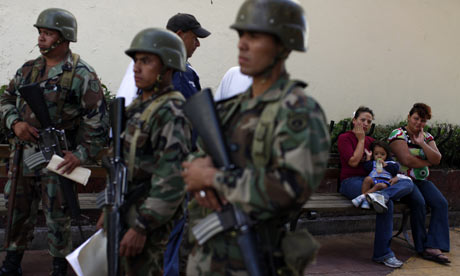
Honduran soldiers stand guard as supporters of ousted president Manuel Zelaya protest outside the national congress in Tegucigalpa yesterday. Photograph: Rodrigo Abd/AP
Thousands of soldiers have been deployed across Honduras to oversee a controversial election which will cement the overthrow of President Manuel Zelaya.
The de facto government has militarised the capital, Tegucigalpa, and other cities to deter pro-Zelaya protests and ensure that Central America's first coup since the end of the cold war prevails.
The authorities blanketed media with patriotic footage of army manouevres and football matches – Honduras recently qualified for the World Cup – to try to stir passion for what it termed an "electoral fiesta".
They hope the election of a new president – Zelaya, 57, is not on the ballot – will consign the toppled leftist to oblivion and pressure the international community to let the 28 June coup stand.
But apathy and resentment may keep turnout low, throwing into doubt whether the poll will resolve a five-month old crisis that has made Honduras a pariah state.
Security forces have suppressed dissent by beating and arresting hundreds of Zelaya supporters in recent weeks, leaving an edgy calm. A state of emergency has been declared for the vote and 5,000 army reservists mobilised.
The head of an Amnesty International delegation expressed concern that security forces had stockpiled 10,000 teargas canisters. "There's an environment of fear and intimidation in Honduras," said Amnesty's Javier Zuñiga. "We have seen an increased level of harassment against those who are seen as opposed to the de facto authorities."
Zelaya's supporters plan to boycott the election but, exhausted and cowed, cannot stop it. "The vote is a farce, a pantomime, but the coup has won," said Miguel Alonzo Macias, a leader of the "resistance" in Siguatepeque, outside the capital.
But Zelaya's foes are not jubilant. Honduras has paid dearly for turning the clock back to an era of military-led overthrows, curfews and repression.
Foreign aid and investment have evaporated, hitting jobs and relief efforts for the half of Honduras's 7 million population who live on less than $2 (£1.21) a day. The country is dangerously polarised between Zelaya's mainly poor, working-class base and the conservative elites and middle class who cheered his fall.
"It's been a tough few months but worth it," said Ricardo Cortes, a taxi driver in Tegucigalpa. "Mel was crazy for power; we had to get rid of him," he said, referring to Zelaya's nickname.
Zelaya, a wealthy logger elected in 2005, became an unlikely champion of the poor when he veered left and embraced Venezuela's President Hugo Chávez. The switch alienated congress, the army, the supreme court and his own Liberal party.
When he tried holding a non-binding referendum on changing the constitution they accused him of plotting to extend his rule – a charge he denied – and ousted him. Soldiers rousted the president in his pyjamas and bundled him into exile. Coup leaders calculated they could ride out the storm until Sunday's election.
Zelaya snuck back into Honduras in September and from the refuge of the Brazilian embassy called supporters on to the streets. But repression and limited popularity meant no wave of people power swept him back to the faux-colonial presidential palace, leaving him marooned in an embassy surrounded by troops.
"To a certain extent the coup leaders have won. Zelaya was ousted and has not returned to power," said Peter Hakim of the Inter-American Dialogue thinktank.
The president's plight has exposed regional faultlines and missteps. Chávez's call for Honduran revolt went unheeded. The Organisation of American States' attempt to mediate flopped. The US condemned the coup but then undermined a power-sharing proposal by saying it would recognise the elections even if Zelaya was not first restored.
"That is very bad for the United States and its relationship with Latin America," Marco Aurelio Garcia, a foreign policy adviser to Brazilian president Luiz Inácio Lula da Silva, told Reuters.
Apart from soldiers on street corners, and clouds which cast a grey pall over the tropical city, Tegucigalpa looked normal . Shops were open, traffic clogged downtown and office workers packed Burger King, Pizza Hut and Dunkin' Donuts. The media, which is largely pro-coup, praised preparations for 5,360 polling stations.
"We just pray that this election will let us start over," said Carlos Mejia, a street vendor. "We need to move on."
The two main candidates are from the traditional ruling elite. Pofirio Lobo, 61, a wealthy rancher and congressman from the National party, is favoured to win. Elvin Santos, 46, is a businessman from Zelaya's Liberal party, which is badly split. In the hope of wiping the slate clean both have sidestepped mention of Zelaya, leaving him like Shakespeare's Banquo, a political ghost.
De facto president Roberto Micheletti is not a candidate. As the coup figurehead he has stepped down for a week to bolster the poll's credibility. He is due to return on 2 December and is expected to remain until handing over to the new president, on 27 January.
Whoever takes over will inherit a mess. The economy is slumping, Latin America has scorned the election's legitimacy and Zelaya supporters, defeated but defiant, are expected to push for a new constitution.
"Under the rock that has been lifted there is a lot of intense anger," said Julia Sweig of the Council on Foreign Relations thinktank. "This is a society that needs major reform."
Allowing the coup to stand sent a worrying signal to a region with fragile democracies and weak institutions, she said. "This sets a terrible precedent for other countries in the region."
Fuente: guardian.co.uk, Friday 27 November 2009 18.34 GMT
.
No hay comentarios:
Publicar un comentario